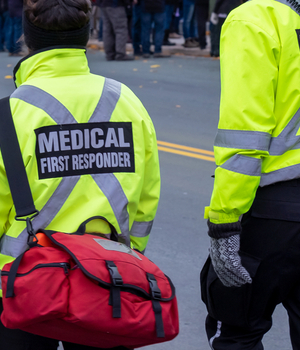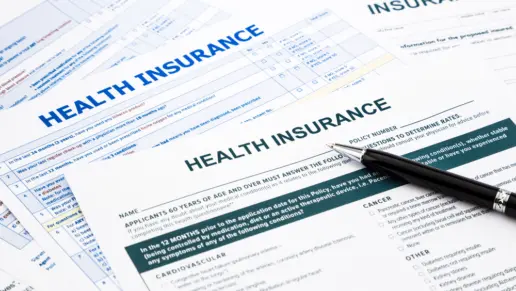When a tragedy occurs, they’re the first ones on the scene. They witness traumatic events and intense situations, sometimes on a daily basis. First responders put themselves on the line time and again, which can take a toll and eventually require access to first responder mental health resources.
Rates of substance use disorder, post-traumatic stress disorder (PTDS), depression, domestic violence, and suicidal ideation are all higher among first responders than other demographics. For example, research indicates that more than half of firefighters may be at risk for anxiety, PTSD, depression, and/or alcohol use disorder.2
First Responder Mental Health Statistics
Substance Abuse and First Responders
First Responder Suicide Statistics
Domestic Violence Among First Responders
Early Signs of First Responder Mental Health Problems
To protect first responder mental health, it’s crucial to recognize early signs of problems. Following are common red flags to watch for that indicate a first responder is suffering from mental health challenges and could use first responder mental health resources.
 Depression/anxiety/constant sadness: Do the bad days outweigh the good? Are you finding it hard to feel pleasure or joy? If this is the case, it’s time to reach out for mental health support.
Depression/anxiety/constant sadness: Do the bad days outweigh the good? Are you finding it hard to feel pleasure or joy? If this is the case, it’s time to reach out for mental health support.- Irritability/anger: Do little things bother you that never used to get under your skin? Are you snapping at loved ones more often than usual? This irritability is a sign of mental health problems.
- Increased or new substance use: Have you started using substances you never used in the past? Are you using drugs or alcohol more often than in the past? These are signs that you are experiencing mental health challenges and are attempting to self-medicate them with substances. This pattern can lead to severe consequences and substance use disorders.
- Reliving traumatic events: Are you replaying traumatic events again and again in your mind? Do you have sudden flash-backs to troubling events? These are symptoms of PTSD, which are treatable.
- Burnout: Are you experiencing nightmares, fatigue, headaches, muscle tension, or digestive issues? These are symptoms of burnout, which can lead to substance abuse and other mental and physical health issues.6
Making the Workplace a Mentally Healthy Environment for First Responders
- Follow the Asher model: Employers can adopt this seven-point model to develop a culture of mental health awareness in first responder settings.5
- Awareness – Be open and honest and make sure everyone knows it’s ok to not be ok.
- Solution-focused approach – Rather than focus on the problems, keep the focus on solutions.
- Peer support – Establish a trained peer-support team that takes a proactive approach to offering support and accountability.
- Resiliency – Educate and train employees on methods that build resiliency, such as deep breathing exercises and mindfulness.
- Healthy habits – Offer only healthy options for lunch menus and vending machines and provide a fitness facility to encourage physical health.
- Spirituality – Establish a chaplain program to offer support for first responders and provide outreach programming, such as “Pray with the Police.”
- Family – Offer relationship support and involve first responders’ families throughout their career.
- Establish policies that are mental-health friendly: Offer sick leave for mental health reasons. Allow employees to use leave time for therapy appointments. Provide breaks based on individual needs rather than a fixed schedule. Allow beverages and food at work in case employees need to mitigate the side effects of medications.
- Offer trainings on mental health awareness: These trainings equip first responders to recognize when someone needs mental health support. Train them to respond appropriately and be proactive in getting help for others or themselves.
- Establish employee assistance programs: These offer support for first responder mental health and physical health. Incorporate stress management training, yearly wellness checks, incentivized fitness programs, anti-stigma campaigns, and work environments that offer natural light to connect with the outside world.
- Provide peer-support programs: These programs should include employees with a variety of backgrounds and ranks. Often, peer programs encourage first responders to seek help, because they are more comfortable speaking with someone who has been through what they are currently going through.
- Schedule resiliency check-ins: These discussions allow employees to share how they’re doing with self-care and stress levels. The check-ins also provide opportunities for employees to discuss any other supports they may need.
- Prioritize rest: Establish shift schedules that encourage first responders to get ample sleep. Educate employees about proper rest, and complete annual sleep-disorder screenings.
Treatment Barriers to First Responder Mental Health Resources?
Despite the clear need for first responder mental health support, many of these professionals don’t get the help they need. Fewer than 50% of first responders who need mental health care seek treatment.4
 Why? It’s not because treatment isn’t available. Resources are there, but several barriers prevent first responders from tapping into these supports. Common barriers include:
Why? It’s not because treatment isn’t available. Resources are there, but several barriers prevent first responders from tapping into these supports. Common barriers include:
- Time constraints due to on-call duties and shift work make services hard to access.
- The first responder culture stresses self-reliance and self-sufficiency.
- First responders may not realize the mental health risks and long-term consequences involved with the stress of their careers.
- First responders don’t know how or where to access services for mental health.
- Professionals fear that getting treatment will have a negative impact on their career.
- 40% fear being fired or demoted.1
- More than half of first responders fear negative repercussions for seeking help.1
Many of these barriers can be removed with proper education about first responder mental health and the resources available. If first responders and their families have a better understanding of the prevalence, cause, and treatment of mental health issues, this can help remove the stigma associated with first responder mental health treatment.
Additionally, first responder employers can offer more flexible hours and shorter shifts to allow first responders easier access to mental health services. Lastly, offering resources – like the list of resources below – can help make first responders more aware of the many supports available.
List of Substance Abuse and First Responder Mental Health Resources
Counseling and Therapy Programs for First Responders
- Intensive outpatient programs: IOPs allow first responders to get treatment while maintaining family obligations. The programs provide aggressive intervention that addresses first responder mental health as well as issues with substance abuse and first responders.
- 12-step Groups/Peer Support for First Responders: These groups provide treatment that creates a sense of community and accountability. The setting gives first responders the opportunity to share their struggles with their peers, who have experienced similar challenges.
- Trauma-informed therapy: Evidence-based methods include Cognitive Behavioral Therapy (CBT), narrative therapy, and eye movement desensitization and reprocessing (EMDR). These treatments can be effective in addressing symptoms of PTSD.
- Alternative therapies: These therapies allow first responders to manage and heal from mental health problems by tapping into their physical or creative sides. Methods may include equine therapy, yoga, adventure therapy, tai chi, or art therapy.
First Responder Mental Health Resources
- 911 At Ease International: Offers free trauma-informed counseling for first responders and their families.
- Bulletproof: Provides confidential resources for addiction, mental health, and treatment for law enforcement professionals and their families.
- For the Frontlines: First responders can text 741741 for help with fear, stress, isolation, and other issues. Counseling is free and is available 24/7.
- Livengrin Foundation: This nonprofit offers a FRAT program (First Responders Addiction Treatment), which specializes in recovery services for first responders and their families.
- National Volunteer Fire Council (NVFC) First Responder Helpline: A helpline offering up to five free counseling sessions for members of the NVFC and their families.
- Rosecrance Florian Program: Substance abuse and mental health program provided by first responders for first responders.
- Substance Abuse and Mental Health Services Administration (SAMHSA): This national organization offers information on addiction and mental health services and available resources.
- Yoga For First Responders (YFFR): Organization offering yoga and classes on stress management. Also trains first responders in yoga instruction.
Support Groups and Organizations for First Responders
- American Academy of Experts in Traumatic Stress: Offers a schedule of first responder online support groups.
- Behavioral Health – First Responder Center for Excellence: A source for articles, videos, and policy updates to educate first responders on behavioral health issues and encourage them to take action.
- COVID-19 – Frontline Workers, Mental Health America (MHA): Offers information on addressing anxiety and stress to prevent first responder burnout. Also offers mental health screenings.
- Crisis Support Resources for Emergency Responders, Disaster Responder Assets Network (DRAN): A network of information and resources for first responder mental health.
- Firefighter Behavioral Health Alliance: Focuses on suicide prevention and behavioral health awareness. Provides workshops for EMS, dispatch, and fire departments.
- Fire Hero Families: Connects firefighters and their families throughout the country to virtual support groups.
- First Responder Support Network: A group of professionals who volunteer their time to provide treatment and aftercare for first responders and their families.
- Frontline Professionals, National Alliance on Mental Illness (NAMI): Tools and resources targeted for first responders and their families.
- Mental Health First Aid for Fire and EMS, National Council for Mental Wellbeing: An early intervention program for firefighters and EMS.
- Project Healing Heroes: Provides support for first responders who are experiencing PTSD.
- ResponderStrong: Offers a help line, self-help tools, articles, educational resources, and professional assistance for first responder mental health.
- Reviving Responders: A nonprofit organization that is dedicated to suicide prevention and promotion of mental health among EMS workers.
- Share the Load Program: Helps fire and rescue departments establish behavioral health programs and offers resources for those seeking support for mental health and addiction issues.
- Survive First: Provides mental health resources for first responders and their families who are seeking support.
- The Code Green Campaign: Also called Code Green, serves all types of first responders with advocacy and education on mental health.
- Wings of Change: In-person and virtual peer support groups, offered for first responders and led by first responders.
Crisis Lines for First Responders
- Access EAP: 800-248-1688. Free, confidential hotline available 24/7. Offers support for mental health and substance abuse problems.
- Copline: 800-267-5463. Answered by retired officers trained in providing mental health support. Available 24/7.
- Crisis Text Line: Counseling support for mental health crises. Available 24/7 by texting BADGE to 741741.
- Frontline Helpline: 866-676-7500. First responders and family members struggling with trauma can get support from former first responders.
- Hero’s Warm Line: 844-833-HERO. Provides resources and confidential peer-support services. Designed for first responders and their friends and family.
- National Suicide Prevention Hotline: Call 988. Connects first responders in crisis to a counselor for support. Available 24/7.
- SAMHSA Disaster Distress Helpline: Call or text 800-985-5990. Available 24/7. Provides support for emotional distress brought on by disasters.
Resources for Family Members of First Responders
- Fire/EMS Helpline: 1-888-731-FIRE. 24-hour helpline offering confidential support for EMTs, firefighters, rescue personnel, and their families.
- Safe Call Now: 206-459-3020. Confidential crisis line for emergency services personnel, public safely employees, and their families. Available 24/7.
- Strategies to Manage Challenges for EMS Families: Provides information on how to manage the challenges EMS families commonly face.
- Supporting Officer Safety Through Family Wellness – Helping Your Child Understand Your Job: Resource from the International Association of Chiefs of Police, designed to help law enforcement officers answer questions their children may have and provides insights into anxiety in first responder children.
Guides and Articles for First Responders
- Effects of Trauma on First Responders: Article series featured in The Dialogue, a SAMHSA publication.
- First Responders and Mental Health: Discuses the perception of mental illness and mental healthcare among first responders and how to improve it.
- First Responders and Mental Health – When Heroes Need Rescuing: Discusses the effects first responders experience as they work on the front lines to protect others.
- Moderating Effect of Self-Compassion and Dispositional Mindfulness on Police Occupational Stress – Preliminary Results: Reviews the early results from a study that examines mindfulness and self-compassion among law enforcement first responders.
- National Data Shows Firefighters’ Mental, Emotional Health Not Getting Enough Attention: Covers the results of a survey of nearly 7,000 firefighters on behavioral and mental health issues.
- Recognizing, Treating, and Managing Post-Traumatic Stress Disorder in First Responders: A discussion of how first responder professions can have long-term mental health impacts and how to provide better interventions for PTSD among first responders.
- Ruderman White Paper on Mental Health and Suicide of First Responders: A study of suicide and mental health issues among first responders.
- Suicide Surveillance, Prevention, and Intervention Measures for the US Fire Service: National Fallen Firefighters Foundation white paper that discusses recommendations regarding suicide and depression among firefighters.
- The Shift Length Experiment – What We Know About 8-, 10- and 12-Hour Shifts in Policing: Looks at the effects of shift schedules on the quality of life and safety of police officers.
- Who Takes Care of the Caregivers? Discusses how grassroots campaigns have risen up to offer mental health support for EMS professionals.
- Why Our First Responders Are So Burned Out: Discussion of compassion fatigue and its effects on first responder mental health and careers.
Mental Health Apps for First Responders
- Calm: Offers assistance with sleep, relaxation, and meditation, to enhance emotional health.
- Headspace: Includes mindfulness exercises, tools for better sleep, and tension-releasing workouts.
- Heroes Health Initiative: Helps first responders track their mental health and offers mental health resources.
- Mindfulness Coach: Provides tips for relaxation, stress reduction, and mindfulness practices.
- Mindshift CBT: Offers science-based techniques for anxiety management, relaxation, and mindfulness.
- PTSD Coach: Provides tools to track PTSD symptoms and offers coping strategies and access to support services.
Books About Mental Health in First Responders
- Copshock – Surviving Post Traumatic Stress Disorder: Helps families understand the effects of PTSD on police officers and prepares police offers for these effects. By Allen R. Kates.
- Emotional Survival for Law Enforcement – A Guide for Officers and Their Families: Covers the professional and personal dynamics of the lives of police officers. By Kevin M. Gilmartin.
- First Responder Resilience: Caring for Public Servants: Provides guidance for first responders who are experiencing PTSD, burnout, or other mental health problems. By Tania Glenn.
- I Love a Cop – What Police Families Need to Know: Psychologist Ellen Kirschman answers tough questions about what it’s like to be married to a member of law enforcement. By Ellen Kirschman.
- I Love a Fire Fighter – What the Family Needs to Know: Psychologist Kirschman shares strategies for firefighters and their families who are facing occupational hazards such as trauma and substance abuse issues. By Ellen Kirschman.
- Relentless Courage – Winning the Battle Against Frontline Trauma: Explores the mental health toll of the trauma that first responders experience and describes methods for healing. By Shauna Springer.
- Surviving the Shadows – A Journey of Hope into Post-Traumatic Stress: Discusses PTSD among law enforcement officers and soldiers and offers ideas for therapies to overcome the symptoms. By Bob Delaney with Dave Scheiber.
- Treating PTSD in First Responders: A Guide for Serving Those Who Serve: Examines PTSD among first responders and the factors that contribute to this mental health disorder. By Richard A. Bryant.
Resources:
- Disaster Technical Assistance Center Supplemental Research Bulletin First Responders: Behavioral Health Concerns, Emergency Response, and Trauma. (2021) https://www.samhsa.gov/sites/default/files/dtac/supplementalresearchbulletin-firstresponders-may2018.pdf
- Wright, H. M., Fuessel-Hermann, D., Pazdera, M., Lee, S., Ridge, B., Kim, J. U., Konopacki, K., Hilton, L., Greensides, M., Langenecker, S. A., & Smith, A. J. (2022). Preventative care in first responder mental health: Focusing on access and utilization via stepped telehealth care. Frontiers in Health Services, 2, 848138. https://doi.org/10.3389/frhs.2022.848138
- Gottlieb, M. A. (2016, July 20). What profession has the highest rate of domestic violence? Michael A. Gottlieb, P.A. https://www.browardcriminallawyer.com/blog/2016/07/what-profession-has-the-highest-rate-of-domestic-violence/
- Wright, H. M., Fuessel-Hermann, D., Pazdera, M., Lee, S., Ridge, B., Kim, J. U., Konopacki, K., Hilton, L., Greensides, M., Langenecker, S. A., & Smith, A. J. (2022). Preventative care in first responder mental health: Focusing on access and utilization via stepped telehealth care. Frontiers in Health Services, 2, 848138. https://doi.org/10.3389/frhs.2022.848138
- Kreider, N. (2021, June 2). Creating a culture of wellness for first responders. First Responder Wellness. https://www.firstresponder-wellness.com/creating-a-culture-of-wellness-is-critical-in-the-first-responder-workplace/
- University, U. S. (2020, September 1). First responder mental health. USU. https://extension.usu.edu/heart/research/first-responder-mental-health
- Luster, R. (2022, September 9). First responders and mental health: When heroes need rescuing. Psychiatric Times. https://www.psychiatrictimes.com/view/first-responders-and-mental-health-when-heroes-need-rescuing





